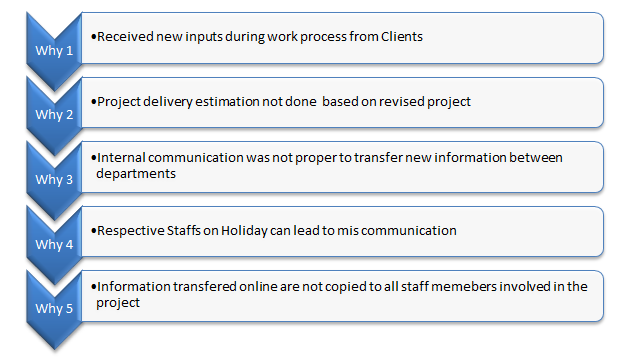
Lean management is undoubtedly an essential tool in reducing waste in production process. But organization struggle to identify and rectify those waste because they were not aware of the methodology to identify those waste. Let’s discuss the 5 important lean tools and strategies to apply in any manufacturing organizations to identify the waste.
As the old saying “Time and Tide wait for no man”, it is very much important in reducing the time wastage by calculating the time to complete a particular task based on customer demand not just based on resources.
Takt Time in Lean management is a rate at which the finished goods to be completed to meet customer demand. Thus it can be computed using the below formula
For example, let’s assume a data entry firm having 9 hour workday with including one hour break time. Thus it has 8 hours for productive hours in a day. The clients require the firm to complete 20 jobs in a day. Therefore
Available productive hours in a day = 8 (or) 480 minutes
Customer demand (Jobs/day) = 20
Takt Time = 480/20 = 20 minutes/job
We need to understand the takt time calculated here is per job not per staff. Sometimes the job can be distributed to different staff member to work in parallel. When assigning the work to the staff members the particular task has to be considered in allocating time limit.
Also the demand is considered constant as 20 it can vary based on client’s objective.
2. Cellular Manufacturing
Cellular manufacturing is an approach to design and process the production work by splitting them into small pieces within a closed proximity. In manufacturing cell approach all the operations to complete the finished products are done in either U-shaped, circular or Zig-Zag layout of the manufacturing unit. This will improve the smooth flow of materials and components through the production process with minimal transport or delay.
3. Five “Whys”?
There is no standard set of questions to list out because the reasons behind every problem can be different. But it is proven and made as a good practice that at least minimum of 5 whys to be asked to determine the root cause of the defects or issues. These questions to be framed when the organization is behind its goals and objectives.
For example: Delivery deadline missed
4. Five “S”
This is one of the most powerful and successful tool to implement in any kind of industry for improving efficiency in manufacturing practices. 5S is a simple tool for organizing your workplace in a clean, efficient and safe manner to enhance your productivity. It is divided into 5 phases, each named after a different Japanese term as Seiri, Seiton, Seiso, Seiketsu, Shitsuke, hence the name 5 S. In English they are as follows
5. SMED or Quick Changeover
The lean management focuses more one splitting up the job to reduce waste in every aspect, it is important to run a production unit with minimum changeover time. In simple, the time taken to remove one finished piece and replace the supply material to start another production process should be reduced as much as possible.
The best examples illustrated by top lean manufacturing organizations are Formula race pit stops. The every millisecond in changing and refueling the machine costs the winning opportunity. Thus planning and arranging the process before hand with excellent team work can improve the efficiency of production.
Conclusion
In Lean management there are number of tools introduced with objective of reducing the waste to improve efficiency in productivity. These 5 tools are used widely among different industrial sector. But there are other tools that are equally important for a Quality professional to learn. NIQC Bangalore, a leading Lean Six Sigma Consulting, Training & certification firm in Bangalore, India, offers Quality Certification Programs (Six Sigma, Lean, ISO, etc.). It is important to become a certified professional in your organization to design and implement the lean tools and concepts.
Check out Lean integrated courses offered by NIQC
© 2025 NIQC International. All rights reserved.